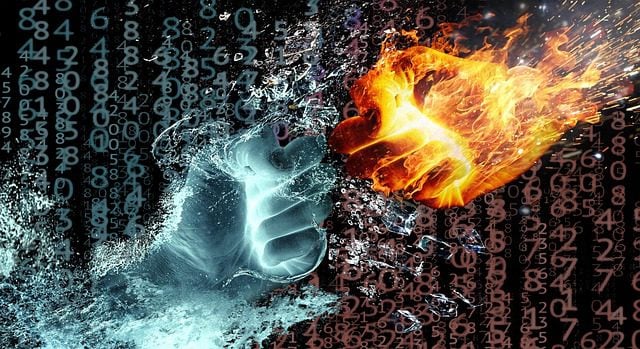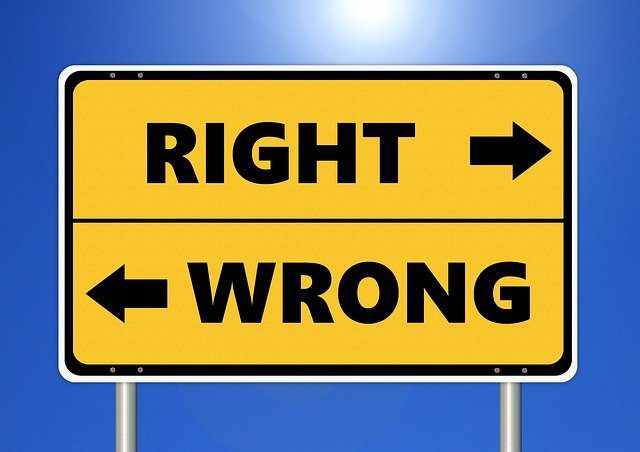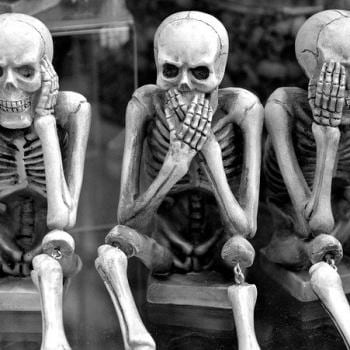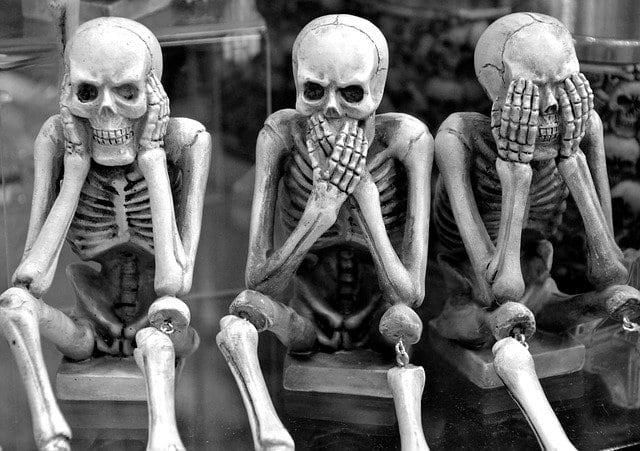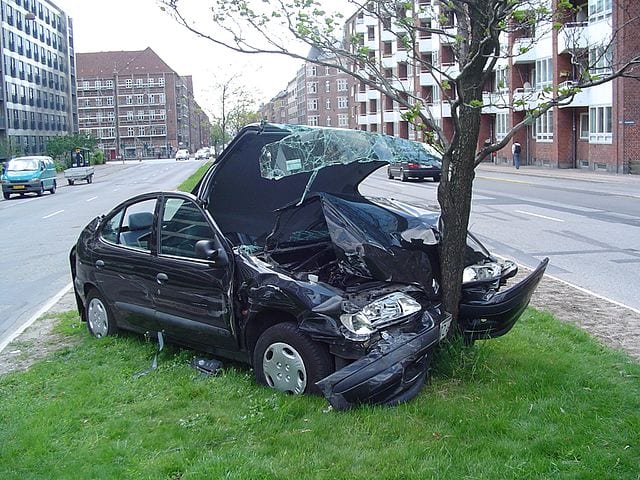Original title: Christian Replies to the Argument From Evil (Free Will Defense): Is God Malevolent, Weak, or Non-Existent Because of the Existence of Evil and Suffering?

One of mass graves at Katyn (Russia), 1943, where the NKVD (Soviet secret police) in 1940 massacred some of the estimated 22,000 Polish officers, policemen, intellectuals and civilian prisoners of war [public domain / Wikimedia Commons]
* * * * *
This is a somewhat abridged version (minus only lengthy quotations from Augustine and Aquinas) of chapter 4 of my book, Christian Worldview vs. Postmodernism (2002).
* * * * *
I. THE NATURE OF FREE WILL AND THE FREE WILL DEFENSE
Having a free choice to potentially, or to be able, to choose evil does not mean that one will indeed choose it. One is free (by definition, it seems to me) to never choose it, as is the case with God. But God is different in that He not only does not choose evil, but cannot ever possibly choose evil, either, because this violates His very nature. That would be like water ceasing to be wet, or a tiger ceasing to be a carnivore, or 2 + 2 suddenly adding up to 5 instead of 4, etc.
Besides, the Christian defines evil as rebellion against, or separation from, God and His will (as the “embodiment” of the Moral Law). So how can God separate from Himself? That’s not only “morally impossible,” but also logically impossible, it seems to me, if indeed God is omni-benevolent and omnipotent, pure being, and entirely self-sufficient, as orthodox Christians believe.
But free will itself does not explain the rise of evil. Christians believe the initial cause of evil is self-autonomy, or the desire to “go it alone” without God, or rebellion. Free will led to the ability to choose self over against God (radical, disobedient autonomy vs. obedient child of God), which in turn led to the Fall, which in turn can explain the rest of human sin and evil. So free will can still be said to be the “cause” (in a secondary, pre-conditional sense) of all this (a necessary condition) but not a sufficient condition in and of itself.
This initial cosmic rebellion (which Christians call the Fall) was the cause of original sin and its primary component concupiscence (i.e., a marked propensity for, or tendency or desire towards, sin). This is an efficient condition and cause of sin, not free will itself, because mankind could have potentially chosen to always be good (as opposed to a robot which must be good and can’t possibly do otherwise). This is true, for example, of the non-fallen angels (also creatures), who chose to be obedient and never to rebel.
Free will means making choices freely; with full consent of the will and the mind, as opposed to some sort of mechanical, automatic choice. The original choice towards evil was simply a choice between oneself and God, rather like a severely disobedient child. It’s a sort of primeval jealousy as well: “God is in control; I want to be in control like God is; therefore I will cast Him off and be my own god” – an attempt to mirror God’s attributes “psychologically.” But this cannot occur in fact (ontologically), for a creature can never rise to equality with or superiority to, its Creator and Source.
The problem is that – given free will – free agents will likely choose to sin. That being the case, God nevertheless chooses the best of all possible worlds to create, and does create, knowing that some will choose evil as a result of possessing the free will — which is the necessary condition for that choice, making it (tragically but necessarily) possible. God chose to let man rebel (nothing catches an omniscient Being by surprise). If He had prohibited that from happening, that would have been a mitigation of free will, it seems clear to me. Free will is (surprise!) really free!
So – to summarize – “free will” in Christian theology doesn’t mean a necessary inclusion of evil and rebellion, but rather, a true choice of the will as opposed to automaton-like behavior (i.e., lacking a will altogether) that couldn’t possibly have been otherwise. One can simply choose to always be good.
The highly-respected Christian philosopher Alvin Plantinga, in his book, God, Freedom, and Evil (New York: Harper & Row, 1974, p. 28), points out that Free Will Theodicy (FWT) is an argument attempting to demonstrate and elucidate what God’s reason for permitting evil (in general) “really is,” whereas the much more modest goal of the Free Will Defense (FWD) is to demonstrate that it is logically and morally possible that God either has a good reason – or, minimally, not an inconsistent reason – for allowing evil (sufficient to overcome the Problem of Evil in its classic Humean formulation), whether known or not.
In other words, it is the difference between outright assertion (FWT) and (merely) allowance of or speculation about any number of logical or theoretical possibilities that defeat alleged disproofs (FWD). Plantinga himself opts for FWD. I also favor FWD in my own apologetics and philosophical theology, yet I sometimes cross over into FWT insofar as I mention or allude to (usually in passing, as a sort of “footnote”) theological answers or speculations that have been given for the existence of evil.
Methodologically and strategically it makes much more sense to stick to a purely philosophical and logical FWD, while on the other hand, I would never deny the validity of serious attempts at FWT, as long as it is permissible to “allow” theology and revelation into the discussion (though always admitting our lack of ultimate explanations and the unavoidable presence of mystery to some degree).
In my comments on natural evil below, I concentrate on inconsistencies in the atheist critique of FWD (in the context of the larger atheological polemic) and recourse to analogy, in an attempt to demonstrate that atheists too often arbitrarily apply different principles to the laws of nature, according to what they are arguing at the moment. This is a sort of “turning the tables” rather than a direct defense of FWD per se. One in effect, however, defends one’s own position in overturning critiques of it, by means of demonstration of radical inconsistency or impossibility of consistent non-absurd application (in this instance, with regard to the laws of nature).
Both FWD and FWT assume that free will makes rebellion possible, which is the direct cause of evil. Free will opens up the possibility of evil, so is necessary for its existence, even though it doesn’t strictly cause it or make it a certainty. And free will resides in man, and is able to bring about evil, insofar as it is used for ends apart from God’s will.
II. NATURAL EVIL AND NATURAL LAWS
Critics object that the free will defense (FWD) doesn’t address natural evils (things such as disease, earthquakes, famine, falling off a mountain, etc.), thus it is insufficient, and fails. This isn’t true at all. FWD doesn’t have to address natural evils because these are a necessary consequence of natural laws themselves. For example:
1. Rocks are hard.
2. Gravity exists.
3. Human faces, after a significant fall due to gravity, do not mix very well with rocks (assuming they happen to sit at the bottom of the fall).
4. The “natural evil” of a crushed skull or broken nose and severe scrapes may, therefore, occur.
Logical conclusion(s):
A. #1-3 are all natural laws (physics, chemistry, and biochemistry).
B. Natural laws are such (by their very nature, and given physical objects) that “injuries” and “annihilations” will inevitably occur.
C. Therefore, “natural evil” (insofar as the term makes any sense at all – it simply reduces to “unfortunate natural events”) is a necessary result of natural laws.
D. Therefore, to eliminate so-called “natural evil” is tantamount to the elimination of natural laws of matter, energy, etc. themselves.
E. Ergo: since elimination of natural laws would produce a chaotic, utterly unpredictable and formless world, this cannot be a possibility in the natural world as we know it; therefore the entire objection to this “absence” in FWD fails utterly.
Natural disasters are a necessary result of natural laws as we currently know them, and this is the real world, not one of the fantasy worlds atheists sometimes invent in order to maintain their rejection of theism, on these grounds. God could have changed these laws and made them operate some other way. But He didn’t.
We don’t have all the answers as to why He did what he did. He also could have made a world where atheists would see the clear evidence for His existence, and never resist it. But He didn’t. That’s because He values human choice and free will more than even obedience to Himself, even when He knows that being children of God is the best and most fulfilling choice for human beings. He doesn’t want coerced slaves; He wants children. And, for our part, we would much rather be sons and daughters of a loving Father than slaves of a wicked Master.
Unfortunately, natural laws as we know them involve decay and death. Everyone dies; we all get a “disease” in that sense. To have no disease and illness would mean being immortal and never having to age, decay or die. But cells, unfortunately, degenerate. Galaxies, stars, and universes all eventually “die.” So does biological life (much more quickly). That’s just how it is. The universe is winding down, and so is every one of us.
It is said that God could and should have performed many more miracles than Christians say He performs, to alleviate “unnecessary” suffering. But this is precisely what a natural world with laws and a uniformitarian principle precludes from the outset. How is it that the atheist can (in their hypothetical theories and arguments against Christianity) imagine all sorts of miracles and supernatural events that God should have done when it comes to evil and the FWD? “God should do this,” “He should have done that,” “I could have done much better than God did,” . . .
Yet when it comes to natural science (which is precisely what we are talking about, in terms of ”natural evil”), all of a sudden none of this is plausible (barely even possible) at all. Why is that? Legions of materialistic, naturalistic, and/or atheist scientists and their intellectual followers won’t allow the slightest miracle or direct divine intervention (not even in terms of intelligent design within the evolutionary hypothesis) with regard to the origin of life or DNA or mammals, or the human brain or eye, or even unique psychological/mental traits which humans possess.
Why would this be? I submit that it is because they have an extreme reluctance to introduce the miraculous when the natural can conceivably explain anything. They will resist any supernatural intervention into biological processes till their dying breath.
Yet when we switch the conversation over to FWD all of a sudden atheists — almost in spite of themselves – are introducing “superior” supernatural options for God to exercise, right and left. God is supposed to eliminate all disease, even though they are inevitable (even “normative”) according to the laws of biology as we know them. God is supposed to transform the entire structure of the laws of physics, so no one will ever get a scratch on their face. He is supposed to suspend a bullet in mid-air so it won’t kill its intended target, or make a knife turn to liquid before it rips into the flesh of yet another murder victim.
In the world these atheist critics demand of God, if He is to be a “good” God, or to exist at all, according to their exalted criteria, no one should ever have to get a corn on their toe, or a pimple, or have to blow their nose, or have chapped lips. God should turn rocks into Jello everytime a child is to fall on one. Cars should turn into silly putty or steam or cellophane when they are about to crash. The sexually promiscuous should have their sexual diseases immediately healed so that no one else will catch them, and so that they can go on their merry way, etc.
Clearly, these sorts of critics find “plausible” whatever opposes against theism and Christianity, no matter what the subject is; no matter how contradictory and far-fetched such arguments are, compared to their attacks against other portions of the Christian apologetic or theistic philosophical defenses. Otherwise, they would argue consistently and accept the natural world as it is, rather than adopting a desperate, glaring logical double standard.
In effect, then, if we follow their reasoning, the entire universe becomes an Alice in Wonderland fantasy-land where man is at the center. This is the Anthropic Principle! Atheists then in effect demand from God the very things they claim to loathe when they are arguing against theism on other grounds. Man must be at the center of the universe and suffer no harm, in order for theism to be true. Miracles must take place here, there, and everywhere, if theism is to be accepted as a plausible or superior alternative to atheism.
The same atheists will argue till they’re blue in the face against demonstrable miracles such as Jesus’ Resurrection. What they demand in order to accept Christianity they are never willing to accept when in fact it occurs to any degree (say, e.g., the healings performed by Jesus). God is not bound by human whims and fancies and demands. The proofs and evidences He has already provided are summarily rejected by atheists, one-by-one, as never “good enough.”
Atheists and other skeptics seem to want to go to any lengths of intellectual inconsistency and hostility in order to preserve their skepticism. They refuse to bow down to God unless He creates an entirely different world, in order to conform to their ultimately illogical imaginings and excessive, absurd requests for what He should have done. They’re consistent in their inconsistency.
By definition, the natural world entails suffering. One doesn’t eliminate that “difficulty” simply by resorting to a hypothetical fantasy-world where God eliminates every suffering by recourse to miracle and suspension of the natural laws He put into place.
In any event, the world as He created it did not originally involve suffering (nor will it in the future, for the redeemed). Man could have chosen to live in such a world, just as the unfallen angels did. They chose never to rebel. But man did, and having done so, now he wants to blame God for everything for which the blame in actuality lies squarely upon his own shoulders.
The natural world can’t modify itself everytime someone stubs their toe or gets a sunburn. That would require infinitely more miracles than any Christian claims have occurred. With a natural world and natural laws, any number of diseases are bound to occur. One could stay out in the cold too long and get pneumonia. Oh, so atheists want God – if He exists – to immediately cure every disease that comes about? Again, the miraculous, by definition, is not the normative. It is the extraordinary, rare event. I might stay underwater too long, swallow water, and damage my lungs. I could fall while ice skating, bump my head severely and damage my brain. I might eat a poisonous mushroom, or get stung by a poisonous snake, etc., etc. That’s how the world works. It is not God’s fault’ it is the nature of things, and the things of nature.
In an orderly, uniformitarian, largely predictable natural world which makes any sense at all, there will be diseases, torn ligaments, colds, and so forth. The question then becomes: “how much is too much suffering?” or “how many miracles is God required to perform to be a good and just God?” At that point the atheist can, of course, give no substantive, non-arbitrary answer, and his outlook is reduced to wishful thinking and pipe dreams.
Materialistic evolutionists resist miraculous creation at all costs precisely because they think miracles are exceedingly rare. Christians apply the same outlook to reality-at-large. We say that miracles will be very infrequent, by their very nature (“SUPERnatural”). And that must be the case so that the world is orderly and predictable enough to comfortably live in, in the first place.
The many atheists with whom I discussed this subject (I was on a list with some 40-60 atheists or agnostics) didn’t really deal at all with the difficulties inherent in making a world where there is not even any “natural evil.” All they did was imagine a world in which there was no suffering (which is easy enough for anyone to do, but extremely simplistic and not exactly a rigorously philosophical approach). They did not ponder all the logical – even physical – conundrums such a world would entail. A small child could opine that the world ought not to have any suffering whatever. But an adult has the responsibility to properly think through all the ramifications of that. He no longer has the luxury of the child, to create fairy-tales at his whim and fancy, about reality.
III. GOD’S OMNISCIENCE AND PROVIDENCE: MUST HE EXPLAIN EVERYTHING TO US?
Critics of Christianity argue that there is so much evil; that its degree, severity and the unfathomable amount of pain resulting therefrom, is not consistent with either a good God, or an all-powerful God Who could conceivably do something to prevent or mitigate all this misery in His own creation.
But the purpose of FWD is not to explain and “reveal” all the deepest mysteries of God’s Providence and omniscience (Christians never pretend to be able to figure everything out, as some atheist philosophers seem to foolishly think they can do). Its purpose is merely to place the origin of evil in man (and fallen angels, which actually preceded man), as a function of his free will and free choice; thereby removing the objection of God’s supposed evil (or weakened) character, due to the existence of evil.
Or it is claimed that God’s foreknowledge is inconsistent with our free will. If we have no free will, then obviously FWD is fallacious and must be discarded. This is based on the fallacious equation of foreknowledge with absolute predestination. The former is merely knowledge without causation; the latter is both. I have “foreknowledge” that the sun will come up tomorrow, and that there will be a time exactly 24 hours from now, when the hands of my clock will be in the same place they are now. Likewise, God knows what I will say and do tomorrow (which is all “now” to Him). But I still have free choice to do and say what I do.
In one sense, God causes everything, for He created everything and enabled everything that exists to possess certain potentialities and actualities. In another (but also equally real) sense, there is secondary, lesser causation, from creatures and immaterial matter. The two do not contradict. God’s ultimate causation of everything is a function of His being Creator, not a function of His omnipotence, and desire to control absolutely everything, down to the smallest detail.
Atheists and agnostics often complain that God hasn’t told us why there is so much suffering. But He certainly has (to some extent, anyway). The answer lies in the Fall and original sin, and (more deeply) the purpose of suffering in God’s redemptive plan; how God uses it for good ends, in His Providence (as He did, e.g., in the death of Jesus). But that’s revelation, and so-called “rationalists” resist that, too, with all their might. Such people cut off their chance of hearing the answer by confining all knowledge to the philosophical realm. One can’t discuss Christian answers and explanations with someone who disallows (as legitimate fields of knowledge) revelation and theology from the outset.
Nor is comfort and solace lacking for people who are suffering. God certainly comforts (or potentially does, depending on our response), but again, that involves becoming a disciple of Jesus, the One who gives peace in the midst of all trials. Since many refuse to do that, they are left with this agonizing quandary as to why God doesn’t seem to “care.” Having refused the cure, or even the possibility of it, they want to now complain that it doesn’t exist.
We learn about reasons for all the suffering we see in the Bible (specifically the book of Job), and in the deep, profound tradition of Christian spirituality. The great theologians, saints, mystics, and martyrs of history have pondered and written about these great mysteries in the most profound depth of insight and wisdom. But non-Christian critics often have so little respect for Christian theology and spirituality that they would refuse to even respectfully consider such explanations. A truly inquisitive, fair-minded person would be open to all explanations, not simply some supposedly “airtight” philosophical argument.
Christians simply acknowledge that we can’t figure everything out (in this case, we can comprehend the broad outlines, but not every jot and tittle of God’s purposes). I should think that would be a rather obvious truth for any philosophically oriented person, whose quest is ostensibly a continual yearning after truth. The very seeking and pursuit presupposes that no one has attained to complete or exhaustive knowledge, as of yet.
Nevertheless, many critics and skeptics appear to demand this of theism and Christianity before they will consider it at all, and make unreasonable and outrageous demands of the position; requiring it to explain absolutely everything, even the deepest mysteries of existence. Of course they don’t apply such a strict criteria to their own beliefs. They can always hide behind the rationale and modus operandi of all skeptics: that there isn’t enough evidence to believe so-and-so, and that atheism, on the other hand, is purely a “negative” phenomenon, and thus worthy of allegiance.
In my opinion, excessive skepticism, which causes one to reject virtually everything as unworthy of belief, is (at bottom) an intellectual cop-out. It is a sort of intellectual pessimism or cynicism. It assumes that the mind is unable to figure out or understand or assent to very much. I do think, however, that a limited degree of skepticism and “hard-nosed” empirical approach is completely warranted. Compared to God’s knowledge, we are indeed relatively very limited in our comprehension. Human beings simply don’t have enough information to be able to say (authoritatively), “I can conceive of a better world than God supposedly made.”
In the Argument From Evil, atheists and other skeptics are attacking the cogency and internal consistency of a Christian argument. Christian arguments presuppose certain characteristics of God. One such characteristic is omniscience. That being the case, it is altogether conceivable that God sees any number of benefits and superiorities to the present world, over against alternate “creative plans” – things we cannot comprehend. Our mental and intellectual inferiority to the Christian God, as Christians understand Him, is self-evident.
Christians, in this instance, are defending an inherently Christian argument, from within our own premises. Whether God exists is another discussion. But if He is indeed as we think He is, then His possession of extraordinary, fathomless knowledge (from the human perspective) clearly follows. That is why FWD is self-consistent and coherent. It works within the Christian paradigm.
To acknowledge a current lack of knowledge is not identical to some sort of “anti-scientific” and “intellectually pessimistic” mentality of “quitting” or claiming we will never know (though it may indeed be the case that we will never know some things). That God’s ways and thoughts are far above our own is a statement of straightforward fact, under Christian assumptions of God’s omniscience. The wise person (e.g., Socrates) instantly recognizes that he knows little (but can potentially learn much).
One atheist argued that God could have done various things to prevent Adolf Hitler’s rise and all the evil and suffering which resulted therefrom: he could have died from a God-induced heart attack in 1929 (sort of like Herod being struck and eaten by worms, in the Bible); he could have had a religious experience and become benevolent and loving, renouncing his anti-Semitism. He could have been created with genes that predisposed him to peaceable behavior, or he could have not been born at all.
God could have done many things. He could have prevented Englishmen from becoming socialist, occultist pacifists with their heads in the sand in the 1920s and 30s. That would, I suppose, have enabled them to hear and act upon Winston Churchill’s warnings for years about the German build-up and obvious intention to resume military, imperialistic activities. They would have seen Neville Chamberlain for who and what he was (an appeasing weakling). The whole thing was easily prevented, as we now know.
Why is it that we must blame God for not preventing it when men easily could have? Could it not be said that God was speaking through Winston Churchill? For if his words had been heeded, then this goal of preventing Hitler’s horrors would have been achieved. Why cannot this working through wise humans be God’s way of achieving His ends, despite human pride, ignorance, and free will? God used prophets to speak His truth to men, and to try to prevent catastrophes, but they wouldn’t listen. Is that God’s fault? Likewise, He can speak truth through individuals today, even if they are not prophets, and He is always speaking in His revelation, the Bible. But men don’t want to hear.
IV. WHAT CAUSED THE FALLEN ANGELS AND THE FIRST HUMAN BEINGS TO REBEL AGAINST GOD (AND WHY COULDN’T GOD PREVENT IT)?
I suppose this question might be expressed in the following terms:
1. Evil in the world casts doubt upon either God’s goodness or His omnipotence.
2. Evil results from man’s free choices and free will, thus – for the moment – separating the origin of evil from God.
3. But why would God create a man who would even have that potentiality in the first place? Does that not still place responsibility for evil on God, and cast doubt on His goodness (perhaps even His omniscience – knowing what would happen), as He could have created otherwise, being omnipotent?
Protestant philosopher Gottfried Wilhelm Leibniz (1646-1716) answered this worthy and important question in the following fashion:
The question is asked first of all, whence does evil come? . . . we, who derive all being from God, where shall we find the source of evil? The answer is, that it must be sought in the ideal nature of the creature, in so far as this nature is contained in the eternal verities which are in the understanding of God, independently of his will. For we must consider that there is an original imperfection in the creature before sin, because the creature is limited in its essence; whence ensues that it cannot know all, and that it can deceive itself and commit other errors . . .
. . . properly speaking, the formal character of evil has no efficient cause, for it consists in privation, as we shall see, namely, in that which the efficient cause does not bring about. That is why the Schoolmen are wont to call the cause of evil deficient.
(Theodicy, 1710, translated by E.M. Haggard, New Haven: Yale Univ. Press, 1952, 135-136)
Frederick Copleston, the noted Jesuit historian of philosophy, wrote of Leibniz’ free will theodicy, and the above citation:
Metaphysical evil is imperfection: and this is the imperfection involved in finite being as such. Created being is necessarily finite, and finite being is necessarily imperfect; and this imperfection is the root of the possibility of error and evil . . .
The ultimate origin of evil is thus metaphysical, and the question arises, how God is not responsible for evil by the mere fact that He created the world, thus giving existence to limited and imperfect things. Leibniz’ answer is that existence is better than non-existence . . . since the imperfection of the creature does not depend on the divine choice but on the ideal essence of the creature, God could not choose to create without choosing to create imperfect beings. He chose, however, to create the best possible world. Considered simply in itself the divine will wills simply the good, but ‘consequently’, that is, once given the divine decision to create, it wills the best possible. ‘God wills antecedently the good and consequently the best’ [Leibniz]. But He could not will ‘the best’ without willing the existence of imperfect things. Even in the best of all possible worlds creatures must be imperfect.
(A History of Philosophy, vol. 4: Modern Philosophy: Descartes to Leibniz, Garden City, NY: Doubleday Image, 1960, 330-331)
Belief in God’s goodness rests on many other grounds, so that the Christian is not overcome by the difficulties presented by the Problem of Evil. Does that require faith? It certainly does. In any event, I don’t see that the Problem of Evil disproves God’s goodness or that it presents any insuperable problems for Christianity.
Human beings are finite creatures, much more limited in knowledge than the angels, and unimaginably less knowledgeable than God. So their free will cannot possibly act in the same fashion (i.e., knowing all contingencies and consequences) as God’s free will. Human beings are not the very ground or essence of love, or Good, as God is. Therefore, the possibility always exists for them – being free – to sin and choose the Wrong and the unloving course of action.
To serve and be unified with God is a free act of the will. A will which is free can also choose to not serve and love God. And that very act is the very definition of evil or sin: separation from God and His will, in which reside the essence of love and Good. This was Leibniz’ argument: that creatures are finite, so that their free will is far more likely to produce sin.
The inherent limitation in the human psyche, intellect, and will brought about rebellion. Human beings are far less intelligent than the angels. The majority of angels were sharp enough to realize that it was of no benefit, and great harm, to rebel against God their Creator. They immediately realized the sheer futility and foolishness of such a drastic move.
Other angels, somehow having obtained pridefulness and self-centeredness and a sort of jealousy or envy of God, did conceive in their wills the idiotic notion that they would be better off opposing God, than being on His side. That was made possible by their free will. God gave them free will, which was such that it included the potentiality for self-centeredness, self-autonomy (with no “need” for God as the Sovereign) and hence, rebellion.
In other words, there must be some logical impossibility for even God to create free creatures who can never and will never sin, without some additional “help” from God (supernatural grace). Human beings before the Fall could have chosen to not sin. But they chose to rebel and reject God’s authority. Atheists naturally deny the profundity and great depth of the hold which sin has on human beings. I don’t know how or why that is.
Human history indisputably reveals that man has been abundantly evil and wicked. Who could fail to see that? But the secular mentality simply locates the causation for that in the environment or God, rather than the individual person – or some constitutional shortcoming in human beings.
To summarize, then, the finite nature of creatures (both before and especially after, the Fall) is such that they are unable or exceedingly unlikely to make perfect choices and to never sin. The problem resides in the creature, as a result of his inherent limitations of intelligence and various weaknesses that a Being perfect in essence does not possess. God can’t make another God. He is by nature one: uncreated and self-existent and perfect; therefore He can’t create another like Himself; ergo: creatures will be intrinsically – logically — limited in some sense.
And this means that (quite conceivably) it is logically impossible for God to create (in any possible world) creatures with free will who will definitely never sin, as a free choice, or literally not be able to sin and still somehow be “free.”
This scenario is no more implausible than the normal atheist habit of placing all blame on this theoretical God they don’t believe in, while winking at and constantly minimizing man’s responsibility for the mess that we find ourselves in. The Christian exercises faith. He sees a God who was willing to take horrible suffering upon Himself and come and die on a cross for us, so that we can one day be totally freed from sin and its horrible consequences. We see a God who loved us so much that He was willing to undergo the sufferings that we have to endure. He didn’t excuse Himself from all of the pain and suffering. He didn’t take a pass.
That may mean nothing to an atheist or other skeptics of Christianity, but we Christians see the boundless love and mercy of God and believe in faith that there is some higher purpose, ultimately beyond our understanding, making all the evil explicable in the end. We know for sure that out of evil much good comes (in terms of people’s reaction to it), and that can become a whole mini-apologetic for FWD in and of itself.
Christians believe this is (though quite difficult to conceive for us, I freely admit) the best of all possible worlds; that evil and sin are such profoundly disruptive and serious entities that they can cause all of what we see, in terms of man against man, and would have in any world in which man was truly free. This is what freedom entailed. To eliminate the possibility of all the suffering would be to jettison free will itself.
But a world where such evil is allowed to occur as a “necessary evil” (no pun intended) also can produce amazing examples of grace and lovingkindness, as we see in the saints. I can easily understand the evil in the world (apart from natural disasters, which I have already addressed) as a rebellion against God, and the fruit of self-centered pride and folly. To me that is not something difficult to conceptualize or comprehend (even though the “best possible world” scenario is difficult to grasp or accept).
What is truly noteworthy and astonishing is how much good and goodness can occur in the world as we know it, given the manifest serious weaknesses of human nature. The fact of such sanctity alongside such vile evil is the remarkable and unexpected thing, and the sign of God’s grace at work amongst us.
For every evil despot in the annals of world history, there can be found a St. Francis of Assisi or a St. Vincent de Paul. For every smug, power-hungry, materialistic selfish person, there is a selfless Mother Teresa or a John Wesley. For every thoughtless, feeble-minded, weak-willed person there is a St. Therese of Lisieux or a Dietrich Bonhoeffer, or those like them, on a lesser scale. The evil persons are easily explained, by the ubiquitous characteristics of human nature. The saints and saintly persons are not. To explain them it is necessary to have recourse to God’s grace and love shed in their hearts.
The great Catholic philosopher, scientist, and genius Blaise Pascal (1623-1662) wrote:
Talk about humility gives occasion for pride to the proud and humility to the humble. Similarly, sceptical arguments allow the positive to be positive. Few speak humbly of humility, chastely of chastity, dubiously of scepticism. We are nothing but lies, duplicity, contradiction, and we hide and disguise ourselves from ourselves.
(Pensees, #655; translated by A.J. Krailsheimer, New York: Penguin Books, 1966, 240)
Man is neither angel nor beast, and it is unfortunately the case that anyone trying to act the angel acts the beast.
(Pensees, #678)
Original sin is folly in the eyes of men, but it is put forward as such. You should therefore not reproach me for the unreasonable nature of this doctrine, because I put it forward as being unreasonable. But this folly is wiser than all man’s wisdom . . . How could he have become aware of it through his reason, seeing that it is something contrary to reason and that his reason, far from discovering it by its own methods, draws away when presented with it?
(#695)
. . . if man had never been corrupted, he would, in his innocence, confidently enjoy both truth and felicity, and, if man had never been anything but corrupt, he would have no idea either of truth or bliss . . . we have an idea of happiness but we cannot attain it. We perceive an image of the truth and possess nothing but falsehood, being equally incapable of absolute ignorance and certain knowledge; so obvious is it that we once enjoyed a degree of perfection from which we have unhappily fallen.
Let us then conceive that man’s condition is dual. Let us conceive that man infinitely transcends man, and without the aid of faith he would remain inconceivable to himself.
(#131)
These are some of the Christian answers to the Problem of Evil, accepted by faith, with a recognition of man’s and reason’s limitations, and the presence of unfathomable mystery at a certain point, yet not contrary to reason, and part of a coherent and consistent Christian worldview.
V. THE FALL OF MAN AND THE INTRODUCTION OF EVIL INTO HUMAN EXISTENCE / FREE WILL IN HEAVEN
Atheists critique the traditional Christian understanding of the Garden of Eden and the Fall of Man by asserting that God simply could have not put the Tree of the Knowledge of Good and Evil there in the first place. “No tree, no fall,” as one atheist put it. God knew what was going to happen, so it is even more outrageous, unjust, and unfair to humanity for Him to let it happen, so the argument goes.
But anyone who reasons in this fashion is missing the whole point of the story (i.e., from within the Christian paradigm and presuppositional framework), which is simply that God told them to obey Him and not to do thus-and-so. What the particular command was is not the crucial thing, but rather, it is the obedience of the creature to its Creator, because that is the reality of “superior-subordinate,” just as a 3-year-old child is subordinate to its parents and no one would think of suggesting otherwise, as if the child can rationally choose to disobey the parent (in normal circumstances) and be better off. Imagine, for instance, a child who decides to no longer eat, or to drive a car, or to do income taxes . . .
The biblical account of Adam and Eve (which is historical and actual) is a morality-tale of obedience vs. disobedience, of union with God vs. unnatural human autonomy. God can’t change the fact of man’s rebellion simply by not putting the tree there so it (supposedly) couldn’t have happened. Why? Because rebellion is an inner condition in the first place. God could have said “don’t stick your tongue out” or “don’t go swimming in the lake with the island in the middle of it.” The particulars don’t matter all that much. Obedience is key, and the acknowledgement of the Creator-creature order of nature or ontological reality.
It has been suggested that God could have created us all in heaven, and thus forego the test that we failed (and which He knew we would fail), to “save a lot of trouble.” But this gets back to the issue of free will and what it means. It happened this way so that we can freely choose God, so that we can attain eternal bliss in heaven, having made a meaningful choice, not because God wound us up like a toy soldier and we followed, not being able to do otherwise.
I am merely speculating now, but I would say that we are rewarded in heaven (as opposed to simply being created there without any “challenge”) because of our free choice. God then empowers us by His grace to live beyond sin. But that wouldn’t eliminate the necessity or near-necessity of evil, because that possibility was opened up in order to have the free will that enabled us to freely choose God and allow His grace to save us so that we can get to heaven.
VI. SUMMARY STATEMENT
It is logically impossible for God to create men with free will and at the same time exclude the possibility of them rebelling and introducing sin and evil into the equation.
God can’t sin because He can’t contradict His own essence, which is pure Good or Love or Holiness. He isn’t schizophrenic. The angels could have rebelled and sinned, and some did (but others didn’t). Mankind could have chosen not to sin, too, but they didn’t take that course. One must take into account the qualitative difference between the free will of God, that of angels (who are far more intelligent than man) and that of man. Free will in the latter is far more likely to result in sin, perhaps almost inevitably so.
Why are human beings essentially imperfect “ontologically” (as created)? They are because it is logically impossible not to be. Creatures by definition are limited and imperfect, because they aren’t self-existent and they aren’t omniscient. God can’t create another God. Only God knows absolutely everything, so that He knows good and evil completely, in all their aspects, contingencies, consequences, what-have-you, and all that is true and false.
The very fact that creatures are not God and neither self-existent nor “pure being” is the problem. Because of that, and given their free will, they can choose to rebel against God their Creator and seek to be autonomous (which is precisely the point where evil is introduced and defined), as if such a thing makes any sense at all and is something other than sheer folly and futility.
Is it possible for God to create human beings free and to create them in such a way that they will always freely choose good? It is possible for those creatures who actually choose to always be good. But God can’t logically eliminate the possibility for others to choose evil without prohibiting free will in the first place. Consequently, some angels chose to never rebel, while others did. So sinlessness is possible, but sinfulness cannot be rendered impossible by God, if free will is to exist.
God offers all men a plan of grace whereby they can be largely – even (theoretically) totally – free from sin. This is what the gospel, justification, sacramentalism, sanctification, regeneration, reconciliation, propitiation, redemption, and related theological concepts in soteriology (salvation theology) are all about.
But this doesn’t preclude the possibility of men spurning God and His plan and continuing on in sin, rebellion, and alleged self-autonomy. They even go to the extent of asserting the historical ludicrosity that Jesus didn’t exist. That’s how far men will go to avoid God and reject Him. God grants the possibility of salvation and sanctification (to be totally perfected after death) for all who will repent of their rebellion, be obedient to His will and become His disciple. That is quite enough.
My position (which I believe to be the orthodox Christian one) is that it was logically impossible given free will, for reality to have been essentially different. Man’s limitations are such, apparently, that in any world where he was given free will, there would likely have been a rebellion (perhaps different in degree in different possible worlds). If there were a world in which this didn’t occur, God would have created it.
So I conclude that such a world is not logically possible (again, coinciding with true free will; of course it would be if men were programmed robots). The difference between theists and atheists is that we place the blame for all this squarely on man’s shoulders, not on God.
What God does is work around this unfortunate state of affairs (in His Providence) and also allow the possibility for all to be made right eschatologically (in the afterlife), in terms of justice and the happiness of each individual person who will humble themselves before God, acknowledge their rebellion and sin, and consciously try to live by God’s will for all mankind. That’s why this is the best of all worlds, because “all’s well that ends well.”
Evil had to occur but it will be completely defeated in the end and heaven will more than make up for all the miseries and suffering which have occurred on earth. Since heaven continues indefinitely, it is infinitely more important proportionately than what has happened here, bad as that often is. Hence the Apostle Paul can state:
I consider that the sufferings of the present time are not worth comparing with the glory that is to be revealed to us.
(Romans 8:18)
And James writes:
. . . What is your life? For you are a mist that appears for a little time and then vanishes.
(James 4:14)
The fact of eternal life in blissful conditions gives an entirely different perspective on this short earthly life: it is merely the blink of an eye compared to everlasting life. This changes everything. To deny this would be like saying that the time one scratched their finger at age four somehow attained a supreme significance with regard to their entire life. That suffering overcame every good thing that happened to them later on, and overwhelmed all. That’s how silly it is to compare the quantity or quality of this life to that of the afterlife (of the saved).
Atheists perhaps agonize more about the world’s suffering in the sense that this life is all they have and it all seems so unjust (but without any ultimate foundation, under atheist assumptions). Yet many of them think nothing of depriving a human child in its mother’s womb from even living and experiencing this life at all. In so doing they deny the fundamental Christian notion that all creation is good (and all human life is sacred), and that it is better to exist than not to.
That is one reason God created, and why it was better for this world and human beings – even with all its suffering – to have been created than to never have existed. One can endure much hardship, knowing what is coming in the end – some great reward. We observe mothers in the travail of childbirth, for example (I’ve seen all four of my children born): all that tremendous physical suffering and trauma, yet it is forgotten the moment they hold their newborn child. That is how it will be to die in God’s graces and enter into God’s presence. And that puts quite a different slant on the Problem of Evil (at least on a practical, individual level).
Of course this viewpoint is often caricatured by atheists as the “pie in the sky” outlook, but it is not. The Christian believes that this life (and how one acts in it) is supremely important, just as the afterlife is. The Christian asserts that if indeed there is an eternal life of bliss awaiting obedient children of God in the future, that this completely changes the perspective of degree and importance of sufferings endured in this life.
The same sufferings would be almost infinitely worse and unjust if this life were all that existed. And in turn, that makes the Problem of Evil a much-lesser objection, within the Christian paradigm. Evil is a far-worse difficulty to work through under atheist assumptions, where it mutates into the “problem of good.” And that will be the subject of our next chapter.











